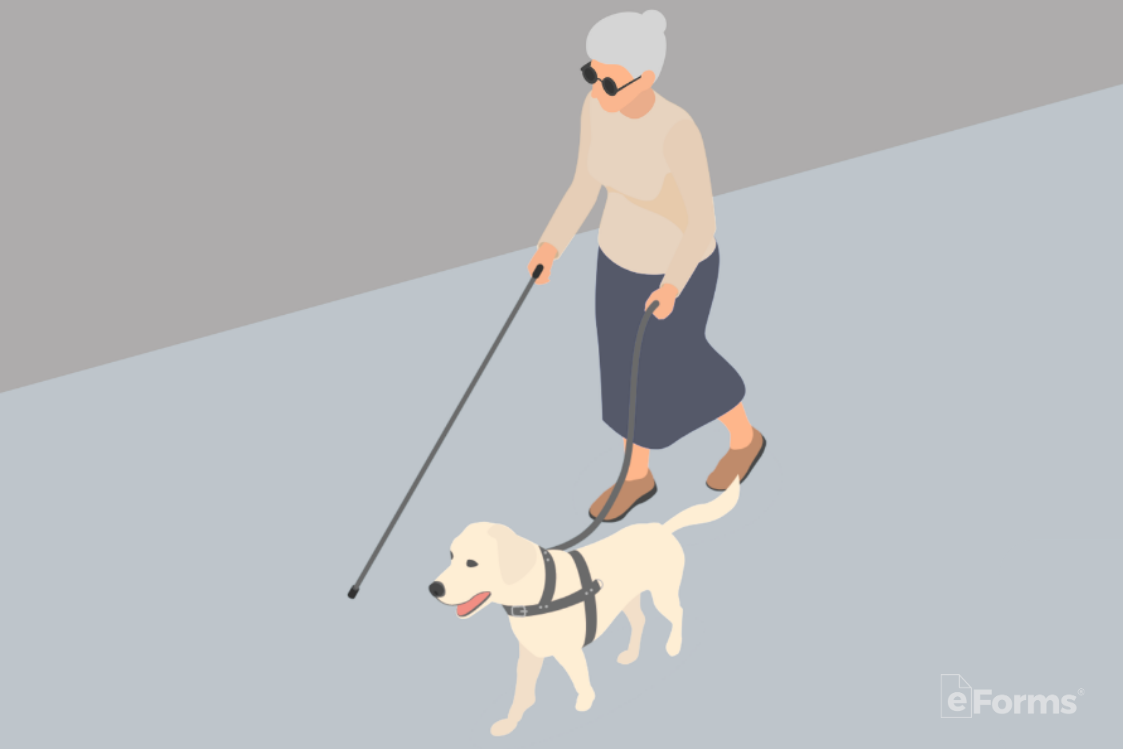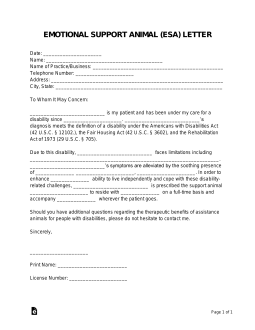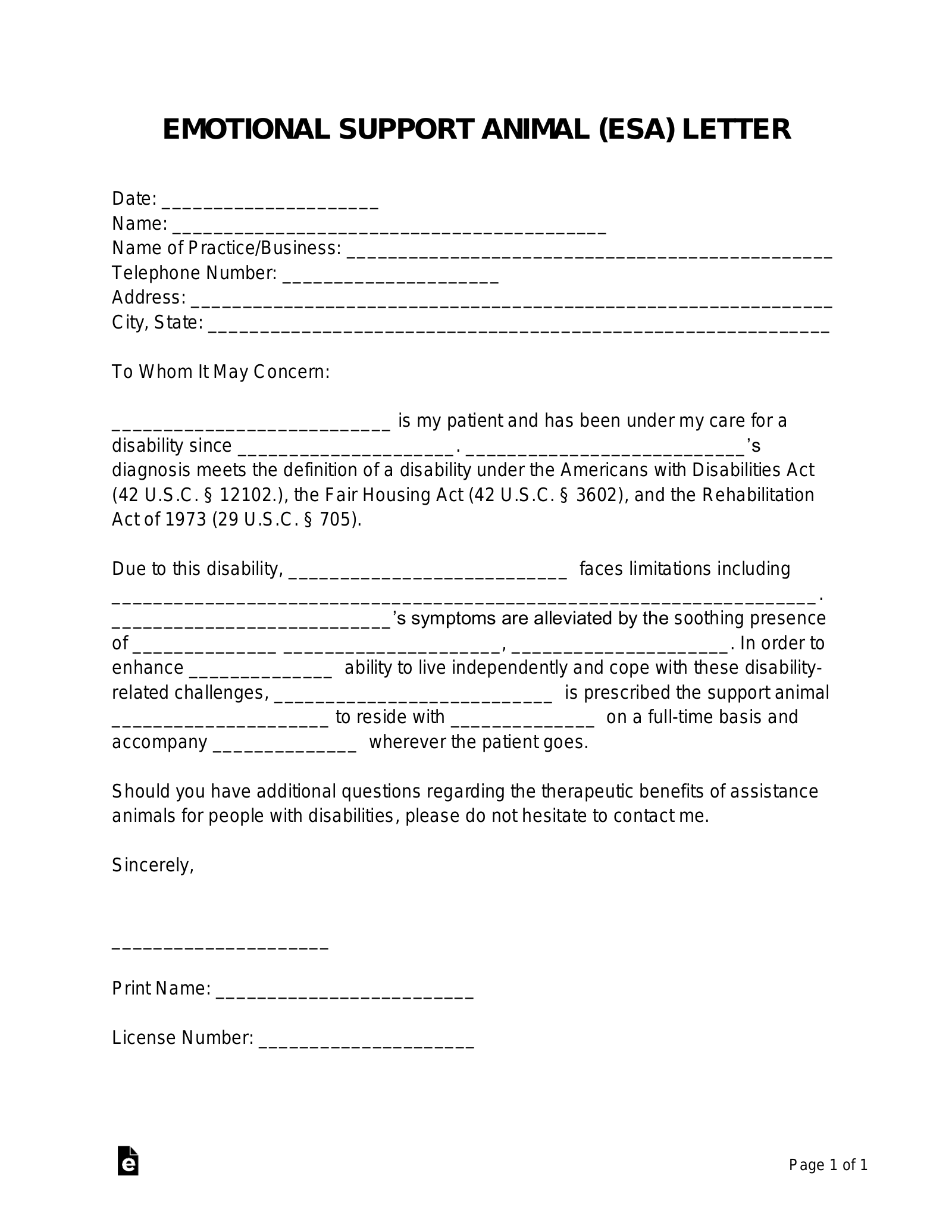Updated September 27, 2023
An emotional support animal (ESA) letter is a document a licensed mental health professional uses to recommend an emotional support animal for a patient. Emotional support animals don’t incur the same legal protections as service animals, and there are different rules for public facilities, hotels, and housing.
Who Qualifies?
Qualifying psychological and emotional disorders that warrant an emotional support animal include but are not limited to:
- Anxiety;
- Major depression;
- Panic attacks; and
- Post-traumatic stress disorder (PTSD).
Table of Contents |
Emotional Support Animals vs. Service Animals
The modern-day concept of the “guide dog” began after World War I as a way to aid soldiers who returned home with damage to their vision. Dr. Bonita “Bonnie” Bergin conceptualized the “service dog” in the 1970s for people with any physical or psychological disability.
A service animal is specifically trained to perform tasks that specifically assist its handler with a disability. Emotional support, therapy, and working animals are not service animals under the ADA.[1]
Emotional Support Animal (ESA)

Emotional support animals provide comfort and companionship for individuals with conditions requiring emotional support to get through their day-to-day lives. They usually help ease anxiety, depression, phobias, or other emotional difficulties.
Qualifications: The person must obtain a prescription or recommendation from a licensed mental health professional. However, the Americans with Disabilities Act (ADA) does not require ESA owners to certify or register their support animal.[2]
Service Animal

The ADA defines service animals as those “that are individually trained to do work or perform tasks for people with disabilities.”[3] A service animal is not a pet. They are generally allowed to go anywhere in public with their handlers. Handlers can train their own service animals and are not required to complete a professional training program.
Service animals assist individuals with intellectual, mental, physical, sensory, or other disabilities. Tasks include:[4]
- Alerting hearing-impaired handlers to the presence of people or sounds;
- Guiding visually-impaired people through environments;
- Pulling wheelchairs; and
- Retrieving objects.
Owners and handlers of service animals must control and supervise the animal at all times in public spaces. Service animals also must be vaccinated according to applicable state and local law.
Psychiatric Service Animal (PSA)
The ADA recognizes psychiatric service dogs as legitimate service animals.[3] They are trained to do jobs that help their handler live with a mental illness or disorder. An emotional support animal is not a PSA because specified training is required to meet that definition. A PSA might perform tasks such as detecting the beginning of a psychiatric episode or providing reminders to take medications.
Other Assistance Animals

There are other types of creatures that provide specialized assistance to humans. Two of the most common are therapy animals and working dogs.
Therapy animals differ from service and emotional support animals because they provide services to more than one person. They offer “therapeutic contact” to improve cognitive, emotional, physical, or social functioning and often work in a team with their owner or handler.[1] The ADA does not recognize therapy animals as service animals.
Species and Breeds
Any domestic animal can be an emotional support animal or a therapy animal. The ADA specifies that service animals usually must be dogs, though in some cases miniature horses may also be service animals.[5] Dogs can be any age, breed, size, or weight.
When it comes to housing, providers are generally required to accept as emotional support animals “animals commonly kept in households” like:
- dogs,
- cats,
- small birds,
- rabbits,
- hamsters; and
- fish.
They are not required to accept “unique” animals like monkeys or kangaroos unless the owner can demonstrate a specific need for that specific type of animal.[6]
Housing providers also do not have to accommodate tenants whose emotional support animals would threaten the health and safety of others, or whose animals would cause substantial property damage.[7]
Where Are Emotional Support Animals Allowed?

With very limited exceptions, service animals must be allowed in any building or facility open to the public. Employees and owners of these facilities also cannot ask for physical documentation or a demonstration of the animal’s job or the handler’s disability; the only questions an entity can ask an individual about a service animal (if the answers are not obvious) are:
- Is the animal required because of a disability?
- What work or task has the animal been trained to perform?
Emotional support animals face more restrictions. The rules vary depending on the type of facility or accommodation and often differ from state to state or county to county.
Employment
Both emotional support and service animals can be considered a “reasonable disability accommodation.”[1] Employers can ask employees for documentation confirming how or why the animal is necessary for the employee to perform their job. It can be denied if an animal poses a threat to the workplace.
Hotels
Hotels must permit service animals but can set their own policies for emotional support animals. Neither emotional support nor service animals may be left alone in hotel rooms.[8]
Housing
Under the Fair Housing Act, which still leaves much discretion to housing providers, providers must make a “reasonable accommodation” for emotional support animals that are not service animals.[6] These rules apply to traditional landlord-tenant settings, homeowners associations (HOA), and student housing.[1] Individuals seeking to have an emotional support animal may request orally or in writing and are encouraged to use the phrase “reasonable accommodation” in their request.
Housing policies that otherwise apply, like pet bans, breed restrictions, deposits, and fees, are typically waived.[3] In determining whether an emotional support animal is a reasonable accommodation, landlords, HOAs, and schools are permitted to ask a person to certify that:
- the tenant or a member of their family is a person with a disability;
- the need for the animal to assist the person with that specific disability; and
- that the animal actually assists the person with a disability.
Public Facilities and Accommodations
Federal, state, and local government facilities, programs, and public places are subject to the ADA. Access for emotional support animals, however, is not guaranteed in public facilities and accommodations.
Restaurants
Restaurants and other food service establishments are not required to allow emotional support or therapy animals in public places.
Transportation
All service animal accommodations laws in the ADA apply to public and private transportation,[1] but emotional support animals are not covered by federal law and are subject to state and local rules. Airlines are not required to accept emotional support animals.[9] Under the Air Carrier Access Act, emotional support animals are treated as pets.[10]
Who Qualifies for an ESA Letter?
A person with a disabling mental illness or disorder can qualify for an emotional support animal. This includes anxiety, major depression, PTSD, and other illnesses.
Definition of a Disability
- Americans with Disabilities Act – Disability is “a physical or mental impairment that substantially limits one or more major life activities of such individual.”[11]
- Fair Housing Act – uses the term “Handicap” in a similar way.[12]
- Rehab Act – An “individual with a disability” is someone who (i) has a physical or mental impairment which for such individual constitutes or results in a substantial impediment to employment; and(ii) can benefit in terms of an employment outcome from certain vocational rehabilitation services.[13]
These laws apply everywhere in the United States. State and local governments may also have other laws that provide additional protections, but they cannot provide a lower level of protection.
Faking a Service Animal
Posing an emotional support animal or any other pet as a service animal is an abuse of the ADA.[14] However, it can be difficult to enforce this side of service animal law because the ADA limits the questions that businesses and the public can ask service animal handlers about their disabilities.
Who Can Write an ESA Letter?

Any licensed mental health professional can legally prescribe emotional support animals with an ESA Letter. Examples include:[3]
- Counselors;
- Registered nurses;
- Social workers (in certain circumstances);
- Therapists;
- Primary care physicians;
- Psychologists; and
- Psychiatrists.
What to Include
All emotional support animal letters should include certain essential sections:
- Provider Information: This section identifies the healthcare provider who wrote the letter, and should include means of contact, like an address and phone number
- Relevant Laws: Mentioning statutes like the Federal Housing Act can help reassure businesses and employees that the patient’s need is legitimate
- Disability Information: Providers should avoid including private medical information in the letter. However, a brief description of the conditions or limitations is helpful, particularly for patients whose conditions are not physically obvious
- Animal Information: This section should include the name of the animal and what tasks it can perform
Does an ESA Letter Expire?
Because an ESA letter is technically a prescription, it can expire whenever the licensed mental health prescriber deems it necessary or appropriate. A patient must request a re-evaluation from their mental health provider to extend or renew the prescription.
How to Get an ESA Letter
The Department of Housing and Urban Development has found that documentation from fee-based websites that provide letters or certificates based on short interviews are usually not “sufficient to reliably establish” an individual’s need for an emotional support animal.[6] And states are increasingly passing their own laws to mandate stricter requirements about issuing the letters.[15]
The best way to obtain an ESA letter is from a personal mental health professional. If that isn’t possible, there are ways to get one from an online mental health professional. Here are a few legitimate services to consider:
Sample
EMOTIONAL SUPPORT ANIMAL LETTER
Date: [DATE]
Name: [HEALTHCARE PROFESSIONAL’S NAME]
Name of Practice/Business: [BUSINESS NAME]
Telephone Number: [PHONE NUMBER]
Address: [BUSINESS ADDRESS – LINE 1]
City, State: [BUSINESS ADDRESS – LINE 1]
To Whom It May Concern:
[PATIENT’S FULL NAME] is my patient and has been under my care for a disability since [START OF CARE DATE]. [PATIENT NAME]’s diagnosis meets the definition of a disability under the Americans with Disabilities Act (42 U.S.C. § 12102.), the Fair Housing Act (42 U.S.C. § 3602), and the Rehabilitation Act of 1973 (29 U.S.C. § 705).
Due to this disability, [PATIENT’S NAME] faces limitations including [DESCRIBE IMPACTS OF DISABILITY ON PATIENT’S LIFE]. [PATIENT NAME]’s symptoms are alleviated by the soothing presence of [HIS/HER/THEIR] [ANIMAL TYPE], [ANIMAL NAME]. In order to enhance [HIS/HER/THEIR] ability to live independently and cope with these disability-related challenges, [PATIENT NAME] is prescribed the support animal [ANIMAL NAME] to reside with [HIM/HER/THEM] on a full-time basis and accompany [HIM/HER/THEM] in daily activities.
Should you have additional questions regarding the therapeutic benefits of assistance animals for people with disabilities, please do not hesitate to contact me.
Sincerely,
_____________________
[PRINT NAME]
Other Resources
- ADA Requirements: Service Animals
- American Kennel Club Therapy Dog Program
- Assessing a Person’s Request to Have an Animal as a Reasonable Accommodation Under the Fair Housing Act
- Bergin College of Canine Studies
- Canine Good Citizen (CGC)
- Is your housing federally subsidized?
- Laws Enforced by EEOC
Sources
- ADA National Network – Service Animals and Emotional Support Animals
- Americans with Disabilities Act (ADA)
- American Kennel Club (AKC) – Emotional Support Animals
- ADA National Network – Service Animals
- ADA Requirements – Service Animals
- Dept. of Housing and Urban Development – Assistance Animals
- § 100.202
- ADA – Service Animals FAQs
- Dept. of Transportation – Traveling by Air with Service Animals
- S.642
- 42 U.S.C. § 12102
- 42 U.S.C. § 3602
- 29 U.S.C. § 705(20(A)
- AKC – Service Dog 101
- CA AB-468


